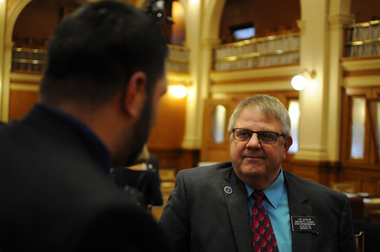South Dakota lawmakers deal with ethics bills, short funds

PIERRE, S.D. (AP) — South Dakota lawmakers navigated lower-than-anticipated tax collections to pass a lean state budget, capping a difficult legislative session dominated by the repeal and patchwork replacement of government-ethics regulations that voters imposed in November.
Republican Gov. Dennis Daugaard spent part of Friday signing a raft of ethics bills into law before lawmakers closed out the main part of the 2017 session. The replacement measures captured the best of the voter initiative while "avoiding the worst," said Daugaard, who signed off on killing the overhaul last month.
The defunct ballot measure instituted a public campaign finance system, created an ethics commission and tightened campaign finance and lobbying laws. GOP lawmakers contended those provisions were unconstitutional. The embattled law wasn't in effect as Republicans were challenging it in court.
In its place, the governor signed proposals to create a narrower government watchdog board, impose less-strict limitations on the gifts that officials can accept from lobbyists and re-instate a two-year ban on private lobbying for many after they leave state government. Lawmakers have passed other ethics bills including a task force to study campaign finance.
The divisive repeal — one day an airplane circled the Capitol for hours with a banner that read "Shame on you! Respect our vote!" — followed a rocky start to session. Within two weeks of the Jan. 10 opening, a Republican lawmaker who admitted having sexual contact with two interns had resigned.
Members dealt with sluggish state tax collections caused by low inflation, less spending in the farm economy and e-commerce transactions that avoid sales taxes. Before heading home, lawmakers passed a state budget for the upcoming fiscal year that includes roughly $1.59 billion in general state spending, nearly $30 million — or about 1.7 percent — below the budget plan Daugaard proposed in December.
"We got the balanced budget," House Majority Leader Lee Qualm said. "Now, I understand there's some people who wish we could have spent more, but we did a lot of work."
Even with the austerity, lawmakers did approve creative funding for key upgrades — with a full price tag of well over $50 million — to the Animal Disease Research and Diagnostic Laboratory, which does daily food safety tests and diagnostics for disease in pigs, cattle and other livestock. It's largely being funded by a plan from agriculture groups to redirect property tax relief for agricultural land to the project.
Ahead of possible protests over the Keystone XL oil pipeline, the Legislature agreed to make it a Class 1 misdemeanor for someone to stand in the highway to stop traffic or to trespass in a posted emergency area. The bill was a scaled-back version of a measure the governor championed amid concerns about large demonstrations like the ones in North Dakota over the Dakota Access pipeline.
Filed under fights averted, a bill that would have restricted which locker rooms transgender students could use was scuttled before it had its first hearing. Last year, Daugaard vetoed a broader bill that included bathrooms.
This year, Daugaard did sign into law broad legal protections for faith-based organizations that refuse based on their religious beliefs to place children in certain households.
The Legislature will return to Pierre March 27 to decide whether to accept or override any vetoes that come from the governor.
Lawmakers are expected to take on a pair of likely vetoes of bills that would allow guns in the state Capitol and let people carry concealed handguns without a permit.
The Capitol carry bill — which would allow people who have an enhanced permit to carry in the building — came with a memorable moment this year when a House lawmaker whose committee was debating it hit a panic button just to see how quickly authorities would respond.
Republican Rep. Lynne DiSanto, who sponsored the constitutional carry bill, said supporters are prepared to try to override a veto.
"If the bill does not go into law, we will be back next year twice as hard," she said. "This issue will not be going away any time soon."
_
Copyright 2017 The Gayly - 3/12/2017 @ 10:06 a.m. CDT





